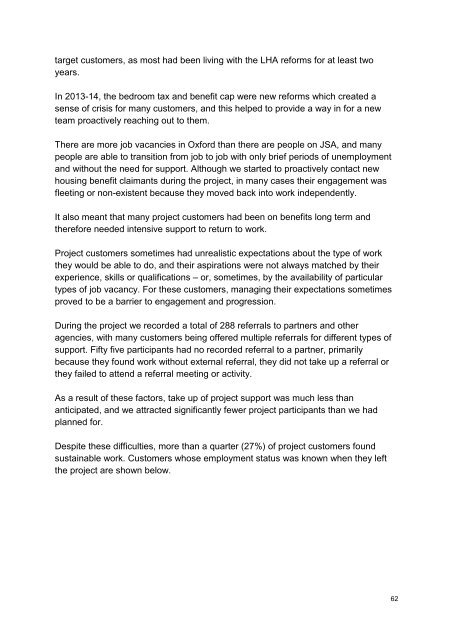Welfare Reform Team Evaluation of European Social Fund pilot project 2014-2015
welfare_reform_european_social_fund_project_evaluation_report
welfare_reform_european_social_fund_project_evaluation_report
Create successful ePaper yourself
Turn your PDF publications into a flip-book with our unique Google optimized e-Paper software.
target customers, as most had been living with the LHA reforms for at least two<br />
years.<br />
In 2013-14, the bedroom tax and benefit cap were new reforms which created a<br />
sense <strong>of</strong> crisis for many customers, and this helped to provide a way in for a new<br />
team proactively reaching out to them.<br />
There are more job vacancies in Oxford than there are people on JSA, and many<br />
people are able to transition from job to job with only brief periods <strong>of</strong> unemployment<br />
and without the need for support. Although we started to proactively contact new<br />
housing benefit claimants during the <strong>project</strong>, in many cases their engagement was<br />
fleeting or non-existent because they moved back into work independently.<br />
It also meant that many <strong>project</strong> customers had been on benefits long term and<br />
therefore needed intensive support to return to work.<br />
Project customers sometimes had unrealistic expectations about the type <strong>of</strong> work<br />
they would be able to do, and their aspirations were not always matched by their<br />
experience, skills or qualifications – or, sometimes, by the availability <strong>of</strong> particular<br />
types <strong>of</strong> job vacancy. For these customers, managing their expectations sometimes<br />
proved to be a barrier to engagement and progression.<br />
During the <strong>project</strong> we recorded a total <strong>of</strong> 288 referrals to partners and other<br />
agencies, with many customers being <strong>of</strong>fered multiple referrals for different types <strong>of</strong><br />
support. Fifty five participants had no recorded referral to a partner, primarily<br />
because they found work without external referral, they did not take up a referral or<br />
they failed to attend a referral meeting or activity.<br />
As a result <strong>of</strong> these factors, take up <strong>of</strong> <strong>project</strong> support was much less than<br />
anticipated, and we attracted significantly fewer <strong>project</strong> participants than we had<br />
planned for.<br />
Despite these difficulties, more than a quarter (27%) <strong>of</strong> <strong>project</strong> customers found<br />
sustainable work. Customers whose employment status was known when they left<br />
the <strong>project</strong> are shown below.<br />
62




